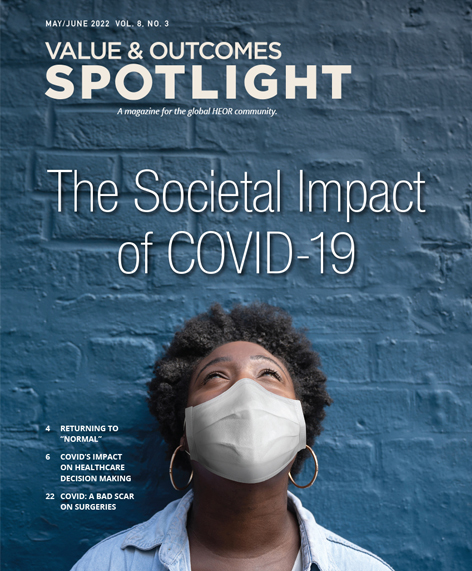HEOR News
 A Comprehensive COVID-19 Response—The Need for Economic Evaluation (NEJM)
A Comprehensive COVID-19 Response—The Need for Economic Evaluation (NEJM)
Researchers Govind Persad and Ankur Pandya say policy makers not only have to understand the benefits and burdens of various COVID-19 policy actions, they have to know how to systematically compare those benefits and burdens before including them in legislation or regulations.
Read more.
 AI Must Be Developed Responsibly to Improve Mental Health Outcomes (Fast Company)
AI Must Be Developed Responsibly to Improve Mental Health Outcomes (Fast Company)
Many mental health startups are incorporating artificial intelligence (AI) into their offerings, but researcher Dan Adler says lessons need to be learned from the use of AI tools in other areas of healthcare because there are areas where AI-powered mental health technologies may underperform in use.
Read more.
 14.9 Million Excess Deaths Associated With the COVID-19 Pandemic in 2020 and 2021 (World Health Organization)
14.9 Million Excess Deaths Associated With the COVID-19 Pandemic in 2020 and 2021 (World Health Organization)
The World Health Organization says the full toll of deaths associated directly (due to the disease) and indirectly (due to impact on healthcare systems) to the COVID-19 pandemic was 14.9 million, demonstrating a need for more resilient healthcare systems in every country.
Read more.
 Evidence Hierarchy in GVDs: The Use of Non-Randomized Evidence Following NICE’s Recent
Evidence Hierarchy in GVDs: The Use of Non-Randomized Evidence Following NICE’s Recent
Methods Update (Source Health Economics)
While randomized clinical trials are still emphasized by NICE’s most recent guidelines update as the top of the evidence hierarchy, the update also includes greater recognition of non-randomized evidence, which could provide complementary evidence in global value dossiers.
Read more.
 Jayson Slotnik Weighs the Future of Value-Based Payments After the Pandemic (AJMC)
Jayson Slotnik Weighs the Future of Value-Based Payments After the Pandemic (AJMC)
Jayson Slotnik, partner at Health Policy Strategies, Inc, talks with AJMC editors about whether patients will continue to want value-based payments rather than fee-for-service, an arrangement that was a benefit during the COVID pandemic.
Read more.
 WHO Launches First-Ever Global Report on Infection Prevention and Control (World Health Organization)
WHO Launches First-Ever Global Report on Infection Prevention and Control (World Health Organization)
A new report from the World Health Organization says if healthcare facilities follow good hand hygiene and other cost-effective measures, healthcare-associated infections can be cut down by 70%.
Read more.
 A Real-World Study of Acute and Preventive Medication Use, Adherence, and Persistence in Patients Prescribed Fremanezumab in the United States (The Journal of Headache and Pain)
A Real-World Study of Acute and Preventive Medication Use, Adherence, and Persistence in Patients Prescribed Fremanezumab in the United States (The Journal of Headache and Pain)
A study using real-world data from the Veradigm Health Insights database found that US patients who took the migraine medication fremanezumab for more than 6 months needed fewer acute and preventive migraine medications and for those with depression and anxiety, fewer prescriptions for depression and anti-anxiety medications.
Read more.
 ICER to Assess Gene Therapies for Hemophilia A and B (ICER)
ICER to Assess Gene Therapies for Hemophilia A and B (ICER)
Next up on ICER’s docket: assessing the comparative clinical effectiveness and value of CSL Behring’s etranacogene dezaparvovec for hemophilia B, and updating its previous hemophilia A assessment on BioMarin’s Roctavian (valoctocogene roxaparvovec). Public discussion will occur in November.
Read more.
 India Conducts First-Ever Nationwide Epidemiological Diabetes Study (Biospectrum Asia)
India Conducts First-Ever Nationwide Epidemiological Diabetes Study (Biospectrum Asia)
The study found that only a third of individuals with known diabetes in India have good control of diabetes, fewer than half have good control of blood pressure and LDL (bad) cholesterol, and only 7.7% met all 3 targets.
Read more.
 Singapore Launches Dementia Research Centre (Biospectrum Asia)
Singapore Launches Dementia Research Centre (Biospectrum Asia)
The goal of the center, launched by Nanyang Technological University, is to better understand how dementia develops in Asians and to advance new strategies to predict and delay the progression of the disease.
Read more.

